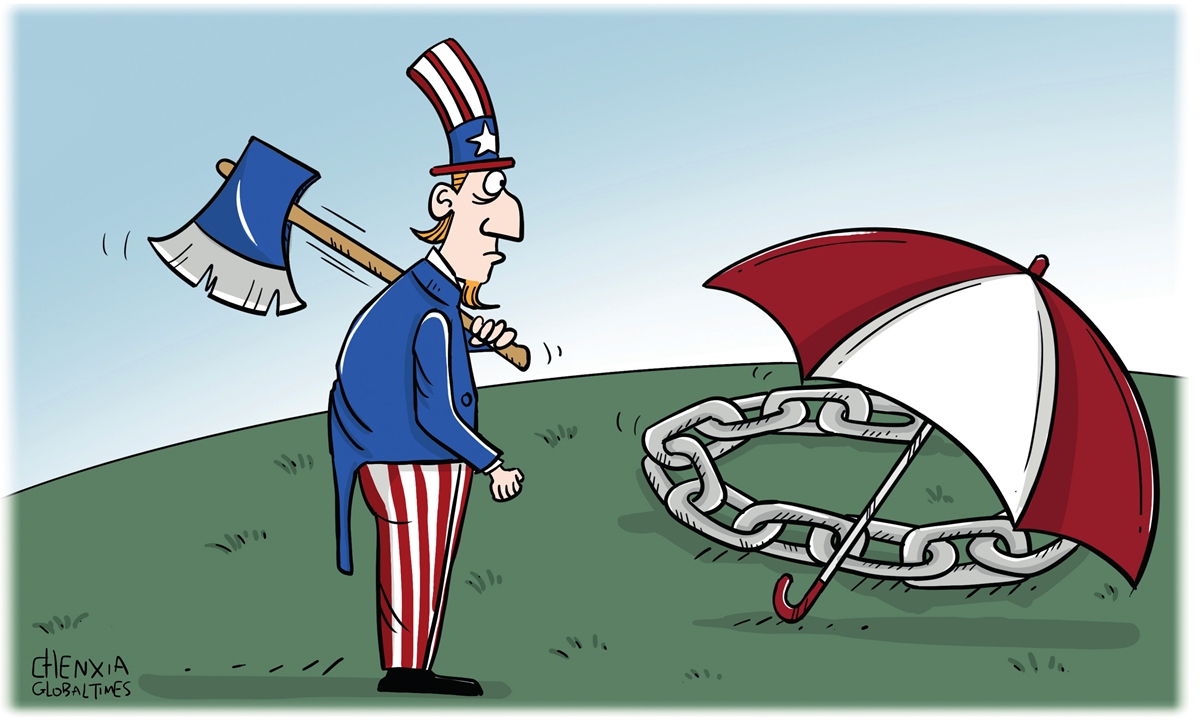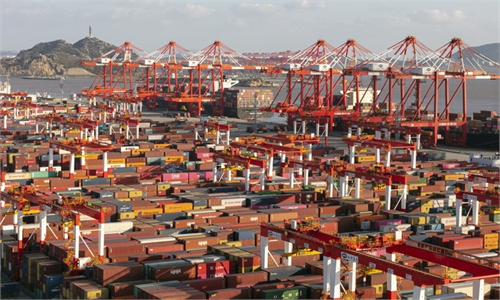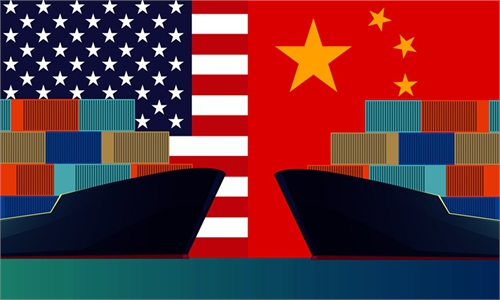
Illustration: Chen Xia/GT
Chinese State Council Information Office on Wednesday issued China's first ever white paper on export controls, which clarifies China's stance on maintaining world peace and development, safeguarding national and global common security. The white paper shares China's ideas and practices in promoting the modernization of its export control system, and advocates that all countries should join hands in dealing with international and regional security risks and challenges under new situations. Moreover, it promotes the development of the international governance of export control toward a fair, reasonable, and non-discriminatory direction.
The white paper shows that China, as a responsible major power, comprehensively illustrates the value of export control owing to the fact that it serves common development and universal security. The depiction is made out of China's goal to build a community with a shared future for mankind, as individual chaos emerges in the international governance of export control. It resolutely warns wrongful behavior and abuse in the form of export control, and injects positive energy into international export control governance. It is of great and far-reaching significance.
In contrast, a small number of Western countries such as the US turn a blind eye to international security and common interests. With a Cold War era mentality centered on hegemonism, and manipulative confrontation, they violate the original intention of export control regulations and the promotion of the compliant trade of controlled items on a whim. They fabricate excuses, abuse export control measures, severely undermine the rules and order of international export control, and jeopardize the foundation and results of international export control coordination and cooperation.
Since taking office, the current US administration has followed the wrong practices of its predecessor, and even went further, using export controls as a major tool to contain the economic development and technological progress of other countries. The US frequently uses excuses including "violation of human rights" and "violation of US national security and diplomatic interests" to abuse export control measures, wantonly putting Chinese, Russian and other countries' enterprises as well as the scientific research institutions on the entity list for sanctions. Those US moves lack factual basis and are full of lies. They are totally political manipulation and bullying tactics.
In order to maintain its technological hegemony and its technological competitive advantage, the US has expanded and strengthened export controls in high-tech fields. The US government is attempting to isolate and block the supply chain through export control, and prevent China from acquiring and using US products or technologies in high-tech field. The US only cares about bringing difficulties to the operation of Chinese companies through these control measures. However, in the era of globalization, these measures have also brought instability to the international industrial and supply chains. The interests of companies in all countries, including American companies, are overshadowed and affected to varying degrees. The "chip shortage" that currently plagues the world is the best example.
The US export control measures, which generalize the concept of national security, harm others without any actual benefit for the US. In today's globalized era, when the US abuses export control measures against foreign enterprises, related upstream and downstream enterprises and their trading partners in the US can hardly be unaffected. After the US announced adding Huawei to its Entity List in 2019, the share prices of American companies maintaining legitimate business with Huawei fell sharply due to concerns about a reduction in revenue and profits. The declined revenue and profits have also influenced enterprises' research and development (R&D), undermining the continuity of R&D investment, and further weakening technological innovation. This has caused serious long-term damage to the environment and competitiveness of technological innovation in the US. If this trend continues, the US' technology innovation will rapidly lose its self-proclaimed openness and popularity. The transfer of the world's technological R&D hub will further accelerate. It's precisely for these reasons that actual harm is being done. The US continues to blur the boundaries of export control, and so, sharp criticisms and denunciations continue to emerge.
The US is deliberately drawing ideological lines, roping in allies in the export control field to form small circles. In multilateral mechanisms such as the Wassenaar Arrangement, the Missile Technology Control Regime, the US has been promoting export control measures that are in line with US interests while attempting to multilateralize its unilateral practices. The US, together with Australia, Denmark and Norway, put forward the Export Controls and Human Rights Initiative recently, saying it's intended to "guide the application of human rights criteria to export licensing policy and practice." Those practices run counter to export control's initial intention of safeguarding international security. They have turned into political manipulations without a bottom line. They take so-called Western values as the basis for export control. Such practices of politicizing economic and trade issues have aroused dissatisfaction in the international community.
The world is undergoing major changes unseen in a century. A new round of technological and industrial revolution is reshaping the global economic structure and profound changes are also taking place in the international balance of power. History has proven that the US's outdated export control measures will only bind them. They won't hinder the technological development and social progress of the vast number of developing countries including China. Mankind is facing many major challenges including the COVID-19 pandemic and climate change. It urgently needs major powers including China and the US to jointly shoulder responsibilities and cooperate in order to respond to risks and challenges. There is just enough time to rein in the situation from the brink of the precipice. The US should discard its outdated cold-war mentality, stop weaponizing export control and conduct dialogue, consultations, exchanges and cooperation in the field of export control to promote all sides to return to the right track of mutual respect, equality and mutual benefit. It should contribute to the common progress of the international community.
The author is associate researcher at Institute of American Studies, Chinese Academy of Social Sciences. opinion@globaltimes.com.cn



